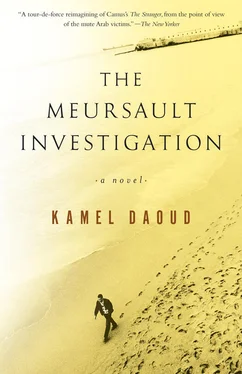Kamel Daoud - The Meursault Investigation
Здесь есть возможность читать онлайн «Kamel Daoud - The Meursault Investigation» весь текст электронной книги совершенно бесплатно (целиком полную версию без сокращений). В некоторых случаях можно слушать аудио, скачать через торрент в формате fb2 и присутствует краткое содержание. Год выпуска: 2015, Издательство: Other Press, Жанр: Современная проза, на английском языке. Описание произведения, (предисловие) а так же отзывы посетителей доступны на портале библиотеки ЛибКат.
- Название:The Meursault Investigation
- Автор:
- Издательство:Other Press
- Жанр:
- Год:2015
- ISBN:нет данных
- Рейтинг книги:5 / 5. Голосов: 1
-
Избранное:Добавить в избранное
- Отзывы:
-
Ваша оценка:
- 100
- 1
- 2
- 3
- 4
- 5
The Meursault Investigation: краткое содержание, описание и аннотация
Предлагаем к чтению аннотацию, описание, краткое содержание или предисловие (зависит от того, что написал сам автор книги «The Meursault Investigation»). Если вы не нашли необходимую информацию о книге — напишите в комментариях, мы постараемся отыскать её.
In a bar in Oran, night after night, he ruminates on his solitude, on his broken heart, on his anger with men desperate for a god, and on his disarray when faced with a country that has so disappointed him. A stranger among his own people, he wants to be granted, finally, the right to die.
The Stranger
The Meursault Investigation
The Meursault Investigation — читать онлайн бесплатно полную книгу (весь текст) целиком
Ниже представлен текст книги, разбитый по страницам. Система сохранения места последней прочитанной страницы, позволяет с удобством читать онлайн бесплатно книгу «The Meursault Investigation», без необходимости каждый раз заново искать на чём Вы остановились. Поставьте закладку, и сможете в любой момент перейти на страницу, на которой закончили чтение.
Интервал:
Закладка:
The whole night abruptly gave way and turned into a sigh — like after sex, I swear. I even came close to groaning, I remember that distinctly, because of the odd shame I still feel whenever I think back on that moment. We remained like that a good while, each of us busy examining his or her eternity. The Frenchman who’d had the bad luck to seek refuge in our house on that summer night in 1962; me, still holding my arm out long after the murder; and Mama, with her monstrous demand finally satisfied. And all of us behind the world’s back, during the ceasefire of July 1962.
On that hot night, nothing had suggested that a murder was about to happen. You’re asking me what I felt afterward? Huge relief. A kind of worthiness, but without honor. Something deep inside me sat down, curled up into a ball, took its head in its hands, and sighed so profoundly that I was touched and tears sprang to my eyes. Then I raised them and looked around me. Again I was surprised by the extent of the courtyard where I had just executed an unknown person. It was as if perspectives were opening up and I could finally breathe. Whereas I’d always lived like a prisoner until then, confined within the perimeter established by Musa’s death and my mother’s vigilance, I now saw myself standing upright, at the heart of a vast territory: the whole nocturnal earth, the gift of that night. When my heart regained its place, all other objects did the same.
Mama, for her part, was scrutinizing the Frenchman’s body, already measuring him in her head for the grave we were going to dig. What she said to me got lost inside my skull, but then she repeated herself, and this time I understood her words: “Work fast!” She spoke in the sharp, firm tone you use when ordering someone to do chores. There was not only a corpse to be buried, there was also a scene to be cleared and cleaned up, like a stage in a theater after the last act is over. (Sweep away the beach sand, stash the body in a fold of the horizon, push away the two Arabs’ famous rock and chuck it behind the hill, make the weapon dissolve like foam, flip the switch to light up the sky again and restart the panting of the sea, and, finally, head for the bungalow to meet up with the frozen characters of this story.) Oh, yes, one last detail. I had to take hold of the clock that registers all the hours of my life and turn the hands back until they showed the exact time when Musa was murdered: Zujj , two o’clock in the afternoon. I could hear the works clicking as they resumed their clear, regular ticktock. Because just imagine, I killed the Frenchman around two in the morning. And from that moment on, Mama began to grow old naturally, she was no longer preserved by spite, wrinkles folded her face into a thousand pages, and her own ancestors at last seemed calm and capable of approaching her to open the lengthy debate that leads to the end.
As for me, what shall I tell you? Life had been given back to me at last, even if I had a new cadaver to drag around. At least, I told myself, it’s not mine anymore, it’s an unknown person’s. Our weird family, composed of the dead and the disinterred, kept that night a secret. We buried the roumi’ s body in a patch of ground near the courtyard. Ever since, Mama’s been watching for a possible resurrection. We did our digging by moonlight. Nobody seemed to have heard the two shots. As I’ve told you, there was a lot of killing going on back then, during the first days of Independence. It was a strange period, when you could kill without worrying about it; the war was over, but deaths were disguised as accidents or the result of ongoing feuds. Besides, a Frenchman who disappeared in the village? Nobody spoke of that. At least, not in the beginning.
There you are, now you know our family secret. You and the treacherous ghost behind you. I’ve watched his progress — he gets closer and closer to us from one evening to the next. Maybe he heard everything I said, but I don’t care.
No, I never really knew that man, the Frenchman I killed. He was big, and I remember his checked shirt, his camouflage jacket, and his smell. That was what first revealed his presence to me that night, when I woke with a start and went outside to identify the source of the noise, which had awakened Mama too. The muffled noise of a fall, followed by an even noisier silence and a dirty smell of fear. He was so white that his skin proved a disadvantage to him in the darkness where he was hiding.
As I’ve told you, the night was transparent, like a sheer curtain. And I’ve also told you there was a lot of random killing back then. The French OAS did some of it, and so did the FLN djounoud who joined up at the eleventh hour. Those were troubled times, with farmlands untended, settlers abruptly leaving, villas occupied. I was on watch every night, protecting our new house from burglars and thieves. The former proprietors — the Larquais family Mama worked for — had run away three months earlier. So we were the new owners of the place by right of possession. This had come about very simply. One morning we were in our little cubbyhole, which adjoined the main house, when we heard cries, furniture being moved, the sounds of an engine, and more cries. This was in March 1962. I was home because there was no work, and Mama had decreed a sort of emergency law, which had been in force for several weeks: I must remain within a perimeter that she could monitor. I saw her enter her employers’ house and after an hour’s stay return in tears — but she was crying tears of joy. She informed me that they were all leaving, the whole family, and that we were charged with looking after the house. We were to act as stewards, more or less, and wait for them to return. They never returned. The day after their departure, beginning at dawn, we moved in. I’ll always remember those first moments. We were fairly intimidated and hardly dared to occupy the main rooms on the first day, contenting ourselves with settling into the kitchen. Mama served me coffee by the lemon tree in the courtyard, where we’d eaten in silence; our flight from Algiers was finally over. At last, we had arrived somewhere. The second night, we ventured into one of the bedrooms and touched the crockery with awed fingers. Other neighbors were on the alert too, looking out for doors to kick down and houses to occupy. We had to decide, and Mama knew just how to go about it. She pronounced the name of a saint unknown to me, invited two other Arab ladies to call on us, made coffee, swung a smoking censer in every room, and gave me a jacket she’d found in an armoire. And that was the way we celebrated Independence: with a house, a jacket, and a cup of coffee. We remained on our guard in the following days, afraid the owners would return or other people would come and kick us out. We didn’t sleep much; we were keeping watch. It was impossible to trust anyone at all. Sometimes at night we’d hear smothered cries, running feet, panting, all sorts of disturbing sounds. House doors were smashed in, and one night I even saw a resistance fighter, a guy well known in these parts, shooting out streetlights so he could plunder the surroundings with complete impunity.
Some of the French who’d stayed were worried, despite the promise of protection they had received. One afternoon they all gathered outside the church in Hadjout, next to the imposing town hall, right in the middle of the main street, to protest the murder of two of their fellows by a pair of overzealous djounoud , who I’m sure had joined the resistance just a few days earlier. The murderers were executed by their commander after a summary trial, but that didn’t stop violent incidents from continuing to happen. Anyway, that same day I was out in the village, looking for an open shop, and in the little group of anxious Frenchmen assembled there I noticed the man who that very evening, or the next day, or a few days later, I can’t remember now, would become my victim. He was wearing the same shirt he’d be wearing the day he died, and he wasn’t looking at anyone, he just blended into his group, who were all staring worriedly down the main street. They were waiting for the Algerian officials to arrive and enforce justice. Our eyes met briefly; he lowered his. I wasn’t unknown to him, and I too had seen him around, with the Larquais family. No doubt a close friend or a relative who often came to visit them. That afternoon there was a big, heavy, blinding sun in the sky, and the unbearable heat scrambled my mind. Generally I walked at a brisk pace in Hadjout, because nobody could understand why, at my age, I hadn’t joined the resistance, which was fighting to liberate the country and chase out all the Meursaults. After stopping in front of the little group of roumis , I started back home under the scorching sun — it was creaking slowly across the sky, its light so glaring that it seemed intended for tracking down some fugitive rather than brutally lighting up the earth. I took a stealthy look behind me and saw the Frenchman hadn’t moved, he was staring at his shoes, and then I forgot about him. We lived at the edge of the village, just before the fields began, and Mama was waiting for me the way she did every time, unmoving and stone-faced, as though braced to receive some always possible piece of bad news. Night fell, and eventually we went to bed.
Читать дальшеИнтервал:
Закладка:
Похожие книги на «The Meursault Investigation»
Представляем Вашему вниманию похожие книги на «The Meursault Investigation» списком для выбора. Мы отобрали схожую по названию и смыслу литературу в надежде предоставить читателям больше вариантов отыскать новые, интересные, ещё непрочитанные произведения.
Обсуждение, отзывы о книге «The Meursault Investigation» и просто собственные мнения читателей. Оставьте ваши комментарии, напишите, что Вы думаете о произведении, его смысле или главных героях. Укажите что конкретно понравилось, а что нет, и почему Вы так считаете.












